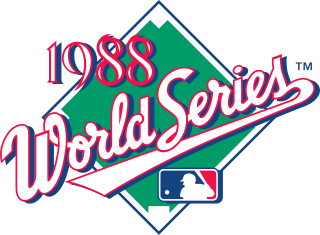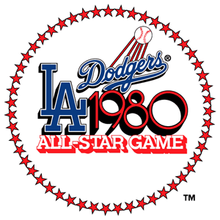
The 1988 World Series was the championship series of Major League Baseball's (MLB) 1988 season. The 85th edition of the World Series, it was a best-of-seven playoff played between the American League (AL) champion Oakland Athletics and the National League (NL) champion Los Angeles Dodgers, with the Dodgers upsetting the heavily favored Athletics to win the Series in five games.

The 1981 National League Championship Series was a best-of-five series to end the 1981 National League season. It was the 13th NLCS in all. The series featured the first-half West Division champion Los Angeles Dodgers and the second-half East Division champion Montreal Expos. The Dodgers won the series three games to two over the Expos, thanks to a ninth-inning home run in Game 5 by Rick Monday in what has ever since been referred to as "Blue Monday" by Expos fans.
The 1980 Minnesota Twins season was a season in American baseball. The Twins finished 77–84, third in the American League West. 769,206 fans attended Twins games, the lowest total in the American League.
The 1988 Major League Baseball season ended with the underdog Los Angeles Dodgers shocking the Oakland Athletics, who had won 104 games during the regular season, in the World Series. The most memorable moment of the series came in Game 1, when injured Dodger Kirk Gibson hit a dramatic pinch-hit walk-off home run off Athletics closer Dennis Eckersley to win the game for Los Angeles. The Dodgers went on to win the Series in five games.

The 1989 Major League Baseball All-Star Game was the 60th playing of the midsummer classic between the all-stars of the American League (AL) and National League (NL), the two leagues comprising Major League Baseball. The game was held on July 11, 1989, at Anaheim Stadium in Anaheim, California, the home of the California Angels of the American League. The game is noted for being the first in All-Star Game history to include the designated hitter. The game resulted in the American League defeating the National League 5-3. The game is remembered for Bo Jackson's monstrous lead-off home run to center field. Jackson was named the game's MVP. The game also featured former U.S. President and former baseball announcer Ronald Reagan sharing the NBC broadcast booth with Vin Scully for the first inning.
The 1976 Cincinnati Reds season was a season in American baseball. The Reds entered the season as the reigning world champs. The Reds dominated the league all season, and won their second consecutive National League West title with a record of 102–60, the best record in MLB, and finished 10 games ahead of the runner-up Los Angeles Dodgers. They went on to defeat the Philadelphia Phillies in the 1976 National League Championship Series in three straight games, and then win their second consecutive World Series title in four straight games over the New York Yankees. They were the third and most recent National League team to achieve this distinction, and the first since the 1921–22 New York Giants. The Reds drew 2,629,708 fans to their home games at Riverfront Stadium, an all-time franchise attendance record. As mentioned above, the Reds swept through the entire postseason with their sweeps of the Phillies and Yankees, achieving a record of 7-0. As of 2020, the Reds are the only team in baseball history to sweep through an entire postseason since the advent of divisional play.
The 1985 Los Angeles Dodgers won the National League West before losing to the St. Louis Cardinals in the National League Championship Series. Fernando Valenzuela set a major league record for most consecutive innings at the start of a season without allowing an earned run (41).
The 1983 Los Angeles Dodgers rebounded from being eliminated from the playoffs on the final day of the previous season to win their second National League Western Division title in three years, but lost in the National League Championship Series to the Philadelphia Phillies 3 games to 1.
The 1979 Los Angeles Dodgers finished the season in third place in the Western Division of the National League. Near the end of the season, owner Walter O'Malley died, and the ownership of the team went to his son, Peter.
The 1978 season ended with the Los Angeles Dodgers winning their second straight National League pennant and losing to the New York Yankees in the World Series again. Dodger coach Jim Gilliam died at the end of the season and his uniform number, 19, was retired by the team prior to Game 1 of the World Series; the team also wore a black memorial patch with Gilliam's number during the World Series. Unlike the previous Dodger team, no member of the team hit 30 home runs after seeing four members hit that mark the previous season.
The 1977 Los Angeles Dodgers season saw Tommy Lasorda in his first full season at the helm of the Dodgers, replacing longtime manager Walter Alston as Manager of the team near the end of the previous season. The Dodgers won the National League West by 10 games and defeated the Philadelphia Phillies in four games in the NLCS, then lost to the New York Yankees in the World Series. This edition of the Dodgers featured the first quartet of teammates that hit 30 or more home runs: Steve Garvey with 33, Reggie Smith with 32, and Dusty Baker and Ron Cey, who both hit 30. The Dodgers duplicated this feat again 20 years later in 1997.
The 1975 Los Angeles Dodgers finished in second place, 20 games behind the Cincinnati Reds in the Western Division of the National League.
The 1974 Los Angeles Dodgers won the National League West by four games over the Cincinnati Reds, then beat the Pittsburgh Pirates in the 1974 National League Championship Series before losing to the Oakland Athletics in the 1974 World Series.

The 1977 Major League Baseball All-Star Game was the 48th playing of the midsummer classic between the all-stars of the American League (AL) and National League (NL), the two leagues comprising Major League Baseball. The game was held on July 19, 1977, at Yankee Stadium in The Bronx, New York, New York the home of the New York Yankees of the American League. The game resulted in the National League defeating the American League 7–5.
The 1962 Los Angeles Dodgers season was the fifth for the team in Southern California, and the 73rd for the franchise in the National League. After spending the previous four seasons at the Los Angeles Memorial Coliseum, they began the season by opening Dodger Stadium, the team's new ballpark. The stadium opened on April 10 with a game against the Cincinnati Reds. The Dodgers proceeded to win a Los Angeles record 102 games and tied the San Francisco Giants for first place in the National League. The Giants won the ensuing playoff series two games to one.
The 1981 Montreal Expos season was the 13th season in franchise history. They made it to the postseason for the first time in franchise history. Their playoff run ended in the National League Championship Series against the Los Angeles Dodgers, with Rick Monday hitting a ninth-inning solo home run in game 5, subsequently referred to as "Blue Monday" by Expos fans. This was the closest the Expos ever got to a World Series appearance while in Montreal.
The 1989 Major League Baseball season saw the Oakland Athletics win their first World Series title since 1974.

The 1984 Major League Baseball All-Star Game was the 55th midseason exhibition between the all-stars of the American League (AL) and the National League (NL), the two leagues comprising Major League Baseball. The game was played on July 10, 1984, at Candlestick Park in San Francisco, home of the San Francisco Giants of the National League. The game resulted in a 3-1 victory for the NL.

The 2008 National League Championship Series (NLCS), the second round of the 2008 National League playoffs, was a best-of-seven baseball game series. The series matched the NL West Champion Los Angeles Dodgers against the NL East Champion Philadelphia Phillies, who had home field advantage for this series due to their better regular-season record. The teams split their season series, with the home team sweeping their two four-game series in August.
The 1980 National League West tie-breaker game was a one-game extension to Major League Baseball's (MLB) 1980 regular season, played between the Houston Astros and Los Angeles Dodgers to decide the winner of the National League's (NL) West Division. The game was played on October 6, 1980, at Dodger Stadium in Los Angeles, California. It was necessary after the Dodgers overcame a three-game deficit in the final three games of the season and both teams finished with identical win–loss records of 92–70. The Dodgers won a coin flip late in the season which, by rule at the time, awarded them home field for the game.






